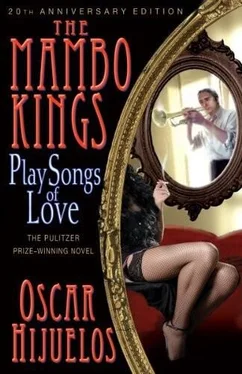Julián’s orchestra packed dance halls all over Oriente and Camagüey. He had conservative tastes, never playing original compositions but relying on the songs of the popular Cuban composers of the day: Eduardo Sánchez de Fuentes, Manuel Luna, Moisés Simón, Miguel Matamoros, Eliseo Grenet, Lecuona. He was the warmest human being Cesar Castillo would ever meet in his life. That portly orchestra leader exuded pure love for his fellowman—“A family and love, that’s what makes a man happy”—and showed this affection to his musicians. That was a time when the Mambo King was close to becoming a different kind of human being.
Cesar never let go of his liking for women. He maintained his king-cock strut and manly arrogance, but around Julián and his family, he felt so peaceful that he calmed down. And it showed in his singing. He gained more control, became more lilting, and developed an affectionate tone in his songs, which people liked and responded to. He had not yet found a way of transforming that into the world-weariness of his records in the mid-fifties. (And if you heard the wrecked voice of Cesar in 1978 and compared it to the golden-toned voice of the 1930s and 1940s, you would have a hard time believing they came from the same singer.) They played all over the provinces in towns with names like Bayamo, Jobabo, Minas, Morón, Miranda, Yara, El Cobre, and in the larger cities of Camagüey, Holguín, and Santiago. They traveled in three trucks and they would make their way down dirt roads, struggling through the brush and forests of the countryside, and into the mountains. They played for campesinos, soldiers, bureaucrats, businessmen. They played for people who lived in houses with palm-thatch roofs, for those who lived in grand-style Spanish villas, and in the plantations and sugar mills, and in beautiful citrus groves, for the Americans who had constructed New England frame clapboard houses, with little back gardens and front porches. They played in towns without modern plumbing or electricity where people hardly knew the name of Hitler, in countryside so dark that the stars were a veil of light and where the thready luminescence of spirits moved through the streets and over walls at night and where the arrival of Julián’s orchestra was greeted like the Second Coming of Christ, with children and dogs and crowds of teenagers following behind it, clapping and whistling wherever they went. They played weddings, baptisms, and confirmation parties, fiestas de quince, and fiestas blancas, where the participants dressed in white from head to toe. They’d perform waltzes and danzones for the old people, and floor-sliding tangos and steamy rumbas for the young.
Julián was a good orchestra leader and a good man. Cesar would have thought of Julián as a “second father” if the word “father” did not make him want to punch a wall. In that time, he learned much about putting together an orchestra and singing from Julián, and enjoyed the glory of performance. He used to throw himself completely into his songs and lived for the moment when the entire ballroom would be on its feet either dancing or applauding.
“Just make them feel that you care for them. You don’t have to overdo it, because they know that, but let them know all the same.”
While singing with Julián’s orchestra the Mambo King became well known. He could walk down the street of many a small town and there would always be someone to come up to him and say, “Aren’t you Cesar Castillo the singer?” He started to acquire a lordly bearing, though one that fell apart when it came to chasing women. Returning to the farm in Las Piñas for his monthly visits, he would feel as if he had come home to a haunted house, the site of many of his fights with his father and the sadness of his mother’s weeping that filled the halls. He would return with presents and advice and with a desire for peace that always erupted, after a day or so, into another fight with his father, Don Pedro, who considered musicians effeminate, doomed men. He’d return and give Nestor music lessons, take Nestor to town. Always impressed with his brother’s musicianship, he had plans to take Nestor into Julián’s orchestra when he was of age and the family would let him leave the house.
Now he remembers and sighs: the long approach to the farm along the riverbank and forest, the dirt road past the houses and over the water, the sun bursting through the treetops. The Mambo King riding on a borrowed mule, a guitar slung over his shoulders…
He had been in the orchestra for four years when he attended a weekend party at Julián’s apartment in Santiago and there made the acquaintance of his niece, Luisa García. He was the handsome young crooner at the end of the table, reveling in the friendship of this older man, guzzling Spanish brandy all night and feeling light-headed enough to easily fall in love. And there she was, Luisa. Sitting across from her during the meal, he smiled and kept staring into her eyes, but she would turn away. Shy and thin, with a plain face, Luisa had a large beaked nose, pretty eyes, and a kindly expression. She liked to wear simple dresses. Although her body was not spectacular, her skin gave off a nice scent of oils and perfume, and when he stood beside her, filling a glass from a punch bowl, he knew she would turn out to be a passionate lover.
She was a schoolteacher and, at twenty-six, three years older than the Mambo King. No one in her family held out much hope that she would get married, but that night the way Cesar kept looking at her became a subject of family gossip. Julián could not have been more delighted. He would call them together and speak to them jointly. “I wanted to show you both the view from this window. Isn’t that something there, the sun’s rays spreading everywhere. ¿Qué bueno, eh?”
Who knew what she felt? She had the downcast look of a woman who was in the habit of taking nervous sidelong glances into mirrors, a woman who was used to taking care of herself. But Cesar? Sitting at that happy table in the company of the first man who had ever really looked out for him, he felt that he wanted to be a part of that family. So he began the most dogged courtship. She’d seen the way he had looked at her cousin Vivian, his eyes looping around the curvaceousness of her rear end, and she had told herself, “No, no, no, no matter what he says to me.” But she gave in to Cesar and started to take walks with him along the streets of Santiago. Always gentlemanly, he held doors open for her, and never cursed in his conversation. Around her, he would make flamboyant gestures with his hands and always dressed neatly, usually in a white linen jacket and clean trousers, and his cane hat, the brim pinched in, pulled low over his brow.
They had their picture taken in front of a movie poster advertising the Betty Grable film Moon Over Miami.
Sometimes he’d get her alone, the two of them sitting in a little deserted park among the flowers. Her iron resistance amused the Mambo King. She’d allow him a few kisses and embraces and one evening he unbuttoned the four left-sided pearly buttons of her blouse and got his hands inside, touching her tender breasts, but she never let him go any further, and he’d laugh out, telling her, “Don’t you know, it’ll happen sooner or later — even if I have to marry you!” There was something funny about this man who’d bedded down many women being foiled by this girl who used to blow air into his mouth and who’d lock her legs tight whenever his long musician’s fingers prowled under her skirt, searching out her most precious “treasure.” How this courtship turned into marriage, no one would be able to explain.
For a time he trusted Luisa in a way he had never trusted anyone. She was an unlikely partner for the Mambo King, especially when put next to the cheap floozies he usually preferred, but Cesar, who had been seeking peace since the days of his childhood, wanted to marry her.
Читать дальше












